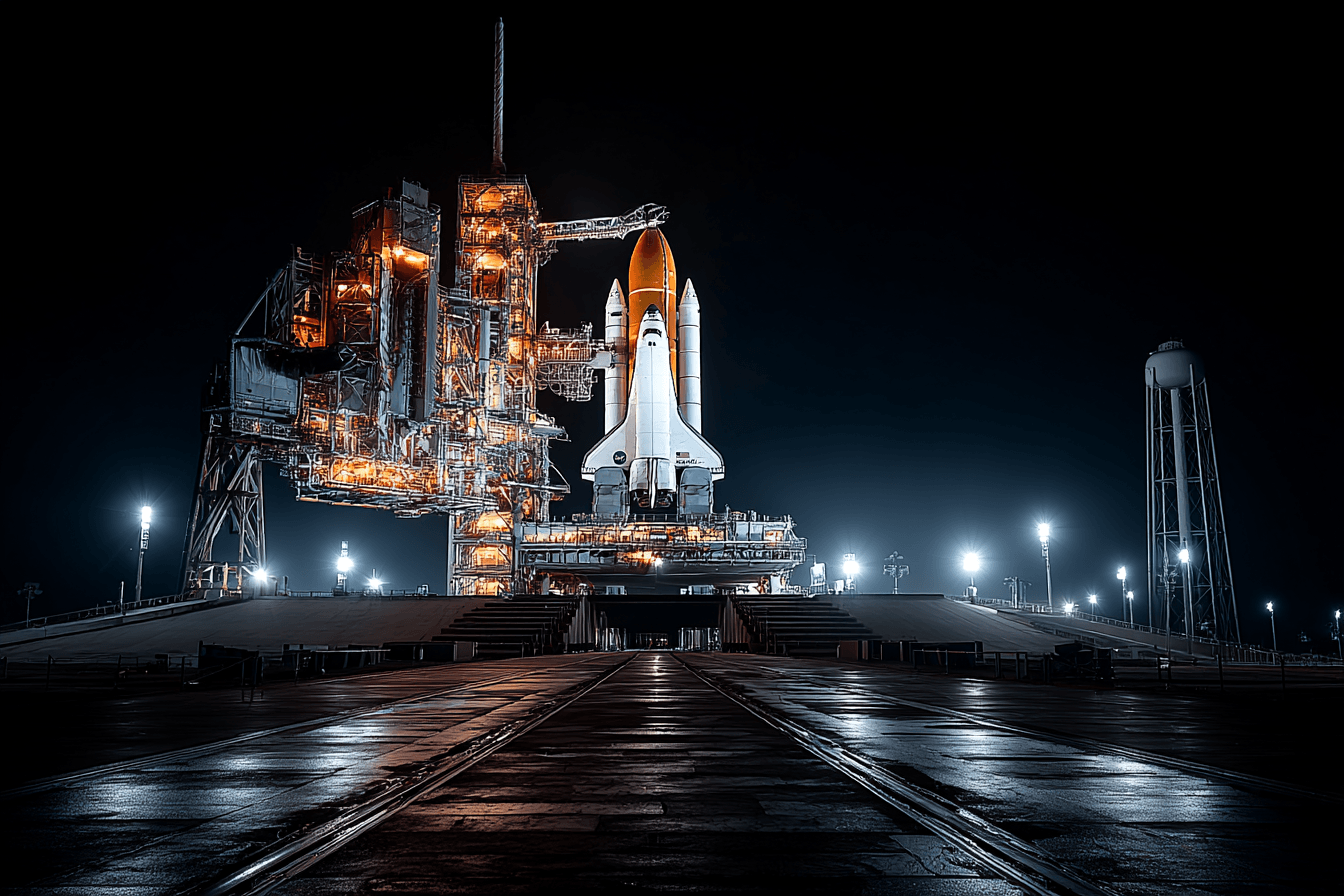
THE PERILS OF BUDGET CUTS: A REFLECTION ON NASA’S FUTURE AND AMERICA’S COMMITMENT TO SPACE EXPLORATION
In the grand tapestry of America’s journey into the cosmos, the recent budgetary proposals put forth by President Donald Trump threaten to unravel the very threads that have woven together decades of scientific achievement and exploration. A proposed 24% cut to NASA’s budget, a staggering reduction that could cripple the agency’s ability to conduct essential scientific research, has raised alarm bells across the political spectrum. As Senators from both parties decry these cuts, it becomes clear that the implications extend far beyond mere dollars and cents; they touch upon the very essence of American ingenuity and our position as a global leader in space exploration.
Historically, the United States has always prided itself on its pioneering spirit. From the bold proclamations of John F. Kennedy, who famously declared in 1961 that we would send a man to the moon and return him safely to the Earth within the decade, to the awe-inspiring images of Neil Armstrong’s first steps on the lunar surface, NASA has been at the forefront of human achievement. Yet, with the current administration’s proposed slashes to NASA's science funding, nearly halving its budget and potentially canceling dozens of vital missions, one must wonder if we are on the precipice of abandoning this legacy.

Senator Chris Van Hollen (D-MD) articulated the sentiments of many when he emphasized the catastrophic potential of such cuts, stating, “We rejected cuts that would have devastated NASA science by 47% and would have terminated 55 operating and planned missions.” His words echo the cautionary tales of history, where insufficient investment in science and technology has led nations to fall behind their global counterparts. The bipartisan rejection of these severe budgetary constraints reflects a collective acknowledgment that NASA's work is not merely a scientific endeavor; it is a cornerstone of national pride and identity.
The proposed cuts seem particularly incongruent when juxtaposed with Trump’s earlier commitment to rejuvenate America’s lunar ambitions. The president’s first-term moonshot goal, directing NASA to land humans on the moon within five years “by any means necessary”, now appears to be lost amid fiscal austerity. The Space Launch System (SLS) and Orion crew capsule, pivotal components of the Artemis program, are now under threat, despite being emblematic of America’s return to lunar exploration. As history has shown, bold aspirations require robust backing; without it, they risk fading into the ether of unfulfilled promises.
Trump’s arguments for eradicating “waste, fraud, and abuse” in government spending has not translated into a coherent strategy for advancing space exploration. Instead, it risks dismantling the very infrastructure that has propelled humanity beyond our terrestrial confines. The proposed phase-out of the SLS and Orion programs, dismissed by Senator Ted Cruz (R-TX), who facilitated an additional $4.1 billion in funding to ensure these initiatives could continue, highlights the discord between the administration’s fiscal prudence and the realities of technological advancement. The SLS, as Cruz noted, is not just a rocket; it is a symbol of America’s aspirations and ambitions in space.

Senator Jerry Moran (R-KS) provided further insight, describing the bipartisan bill that emerged from these discussions as “an ambitious approach to space exploration.” This is not merely about building rockets; it is about fostering innovation and ensuring that the United States remains a leader in a domain that will shape the future. The Artemis program, with its promise of returning humans to the moon, is more than a series of missions; it represents a renewed commitment to exploration and discovery. The premature termination of systems like SLS and Orion could jeopardize America’s leadership in space, leaving the door ajar for other nations to seize the initiative.
As we stand at this crossroads in space exploration, it is crucial to remember the words of the late astronaut John Glenn, who spoke of the importance of science and exploration in expanding our horizons. “We are all explorers,” he said. “We are all adventurers in the pursuit of knowledge.” It is this spirit of exploration that must fuel our policy decisions, guiding us to invest in science and technology that can inspire future generations.
NASA’s budget is not merely a line item; it is a reflection of our values as a nation. It signifies our commitment to pushing the boundaries of what is possible and our dedication to inspiring the next generation of scientists, engineers, and explorers. The agency has been a beacon of hope and ingenuity, not just for America but for the world. It has united people across national borders in the shared quest for knowledge and understanding of the universe.
The battle over NASA’s funding is emblematic of a larger struggle within American society- a struggle between short-term fiscal constraints and long-term vision and ambition. As we reflect on our past achievements and look toward the future, let us not forget the lessons of history. The challenges we face today are not insurmountable, but they require a steadfast commitment to investing in our future. By rejecting the proposed cuts and supporting a robust budget for NASA, we can ensure that the spirit of exploration continues to thrive, lighting the way for generations yet to come. In the words of Albert Einstein, “Imagination is more important than knowledge,” and in the realm of space exploration, it is this imagination that will carry us beyond the stars.
The exploration of space has always represented humanity's quest for knowledge and understanding, pushing the boundaries of what we know about our universe. NASA, as the leading agency in this endeavor, has been pivotal in not only advancing scientific research but also in fostering technological innovation that has far-reaching implications for life on Earth. The proposed budget cuts by the Trump administration, which threaten to significantly reduce NASA's funding and programmatic capabilities, raise critical questions about our commitment to exploration and the future of scientific discovery.

The historical context of NASA's formation in 1958 during the Cold War underscores the urgency and importance of its mission. The space race was not merely about technological supremacy; it was a matter of national pride and security. The launch of Sputnik by the Soviet Union in 1957 ignited a fervor in the United States, leading to the establishment of NASA and the ambitious goal of landing a human on the moon. This monumental achievement in 1969 was a testament to what could be accomplished with bold vision and investment in science and technology. It united a nation and inspired the world, reinforcing the idea that exploration is an inherent part of the human spirit.
However, the political landscape surrounding space exploration has always been fraught with contention. The cyclical nature of funding, where programs are launched with great fanfare only to face cuts during times of fiscal tightening, has been a recurring theme. The current budget proposal is a reflection of these age-old tensions, where short-term political considerations threaten long-term advancements. Senators from both parties, recognizing the detrimental impact of these cuts, have rallied together to advocate for NASA's funding. This bipartisan support highlights a shared understanding of the agency’s role in driving innovation, creating jobs, and maintaining America's leadership in science.
Furthermore, the implications of slashing NASA's budget extend beyond the agency itself. The economic impact of NASA's missions is significant; for every dollar invested in NASA, there is a return of approximately $10 to the economy through job creation and technological advancements. The ripple effects of NASA’s work can be seen in various fields, from telecommunications to healthcare, where technologies developed for space missions have been adapted for use on Earth. This interconnection between space exploration and everyday life exemplifies the broader benefits that arise from investing in scientific research.
As we look forward, the Artemis program stands as a beacon of hope for a new era of exploration. Aimed at returning humans to the moon and eventually sending crewed missions to Mars, Artemis is not just about revisiting old frontiers; it is about establishing a sustainable presence in space and paving the way for future generations. The program envisions creating a lunar base that could serve as a launchpad for deeper space exploration, fostering international collaboration and partnerships that echo the spirit of cooperation seen during the Apollo missions.
The proposed cuts to NASA’s budget and the potential cancellation of key programs threaten to undermine these ambitions. The Artemis program, which embodies a collective aspiration for exploration, relies on stable funding to achieve its goals. In the face of these challenges, it is essential to remember the words of NASA’s first administrator, T. Keith Glennan: “We should not be afraid to take risks in the pursuit of knowledge.” This ethos of boldness and courage is what has driven humanity to explore the unknown, and it is crucial that we uphold this spirit as we navigate the complexities of modern governance and budgetary constraints.
Moreover, the global landscape of space exploration is changing rapidly. Other nations, particularly China and Russia, are investing heavily in their space programs, seeking to establish their own foothold in the cosmos. This competition necessitates a robust and well-funded NASA that can keep pace with international advancements. As Senator Moran aptly stated, the bipartisan bill reflects an “ambitious approach to space exploration,” recognizing that America’s leadership in this arena is not a foregone conclusion but something that must be actively pursued and protected.
The fate of NASA and the future of American space exploration hang in the balance as budgetary decisions are made. The proposed cuts not only threaten the agency's immediate capabilities but also risk diminishing the nation's long-term commitment to scientific discovery. As we reflect on our rich history of exploration and the lessons learned from it, we must advocate for policies that support and expand NASA’s mission. In doing so, we reaffirm our belief in the power of exploration to inspire, innovate, and unite humanity in the quest for knowledge, an endeavor that transcends borders and resonates with the very core of what it means to be human. The stars are calling, and it is our responsibility to answer that call with courage and resolve.

Oliver N.E. Kellman, Jr., J.D. Managing Partner & Executive Managing Director
"The stars do not belong to those who gaze at them, but to those who dare to reach for them — and invest in the journey."
— Oliver N.E. Kellman, Jr., J.D.
Follow me
ABOUT
Created with © systeme.io



